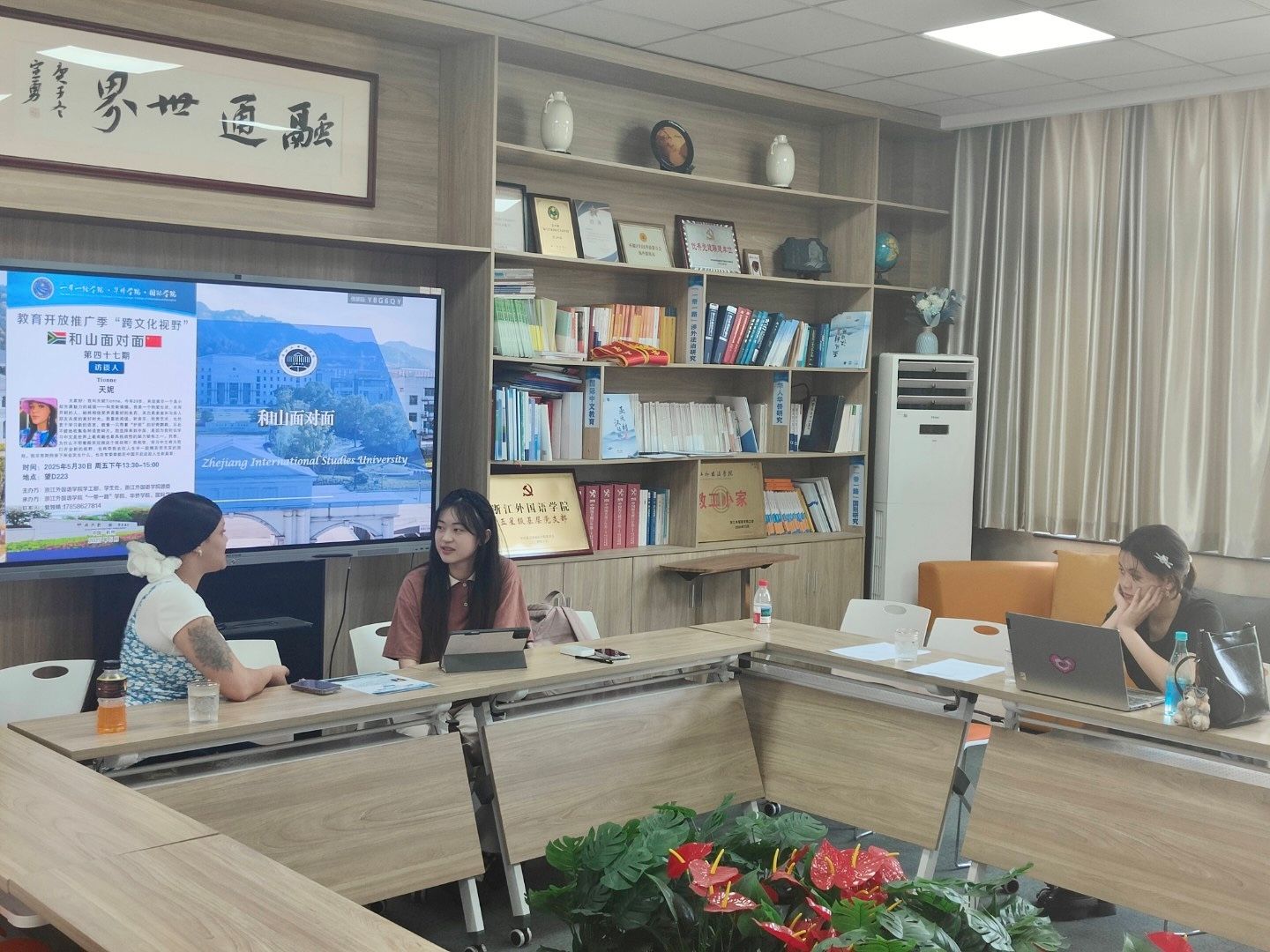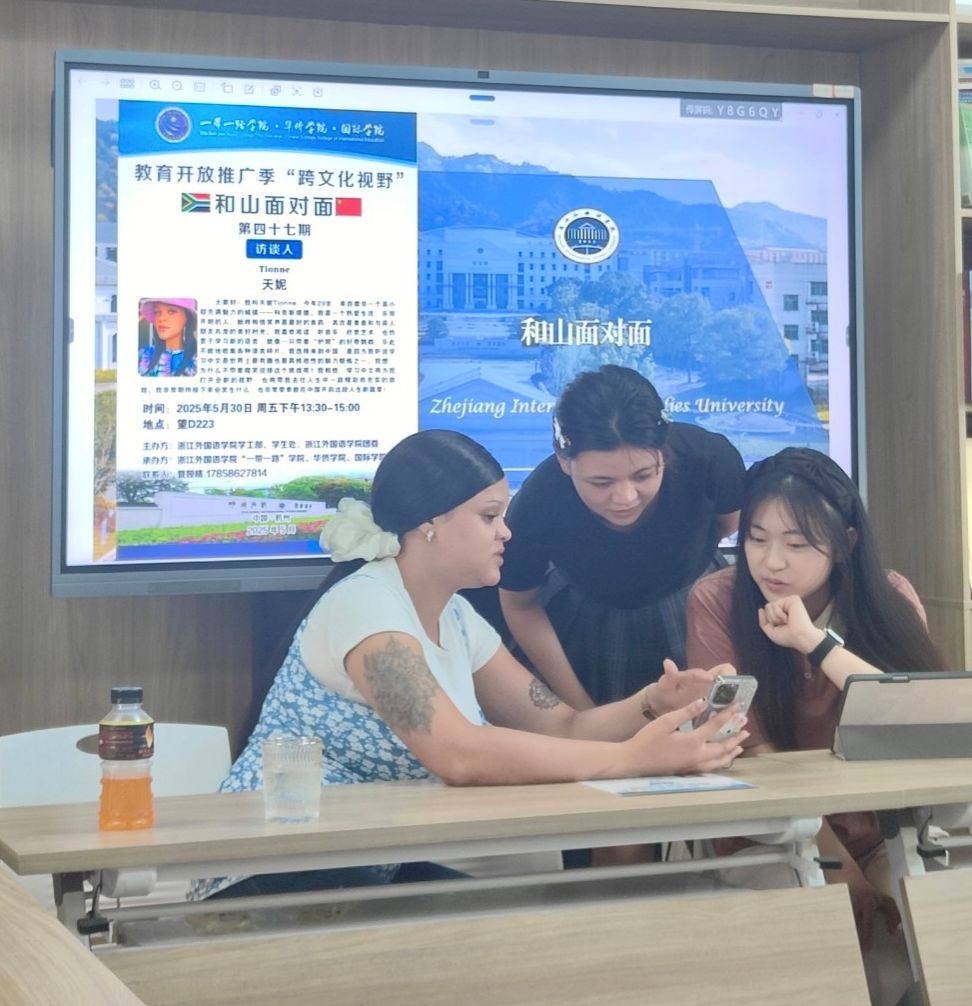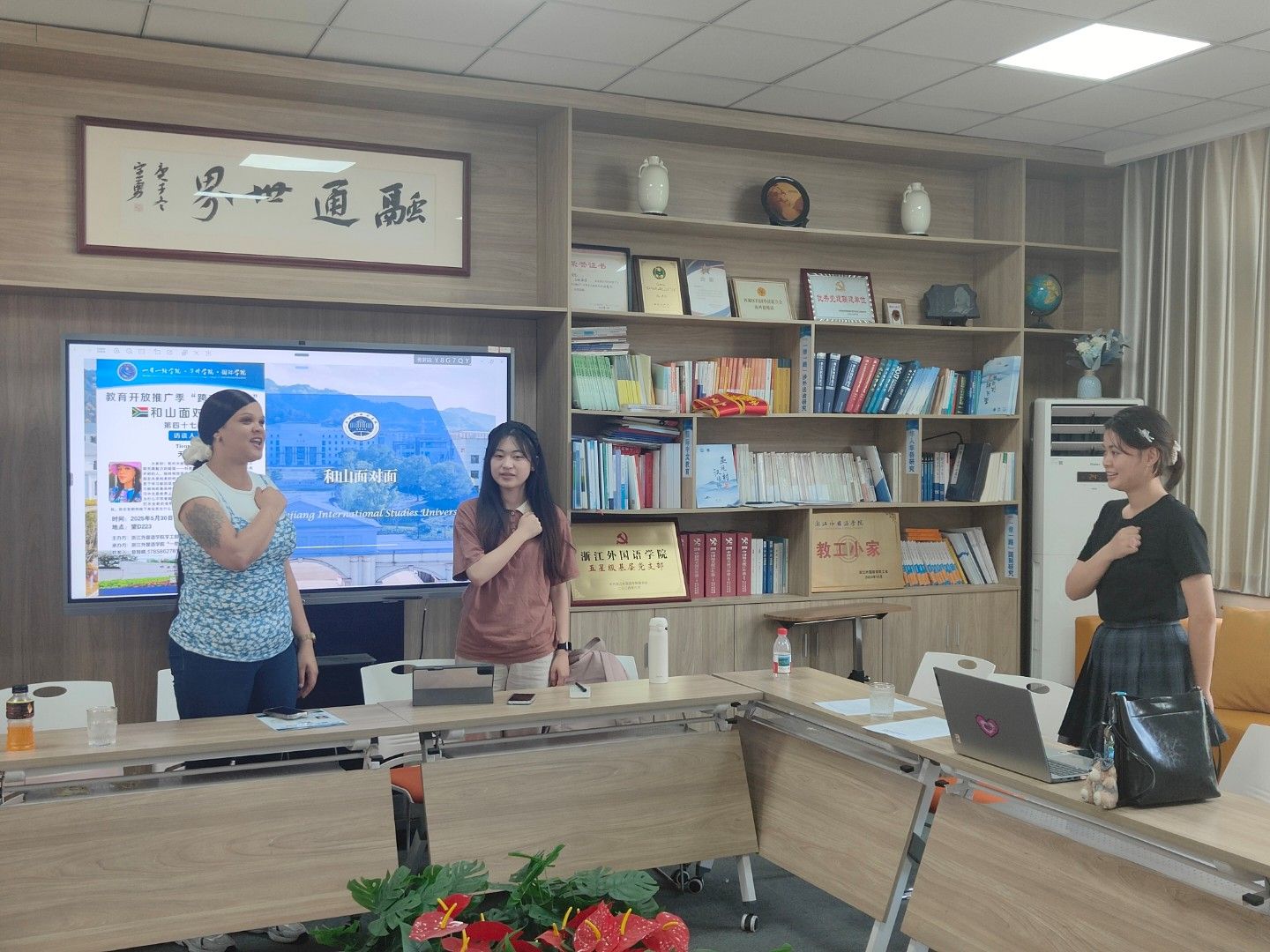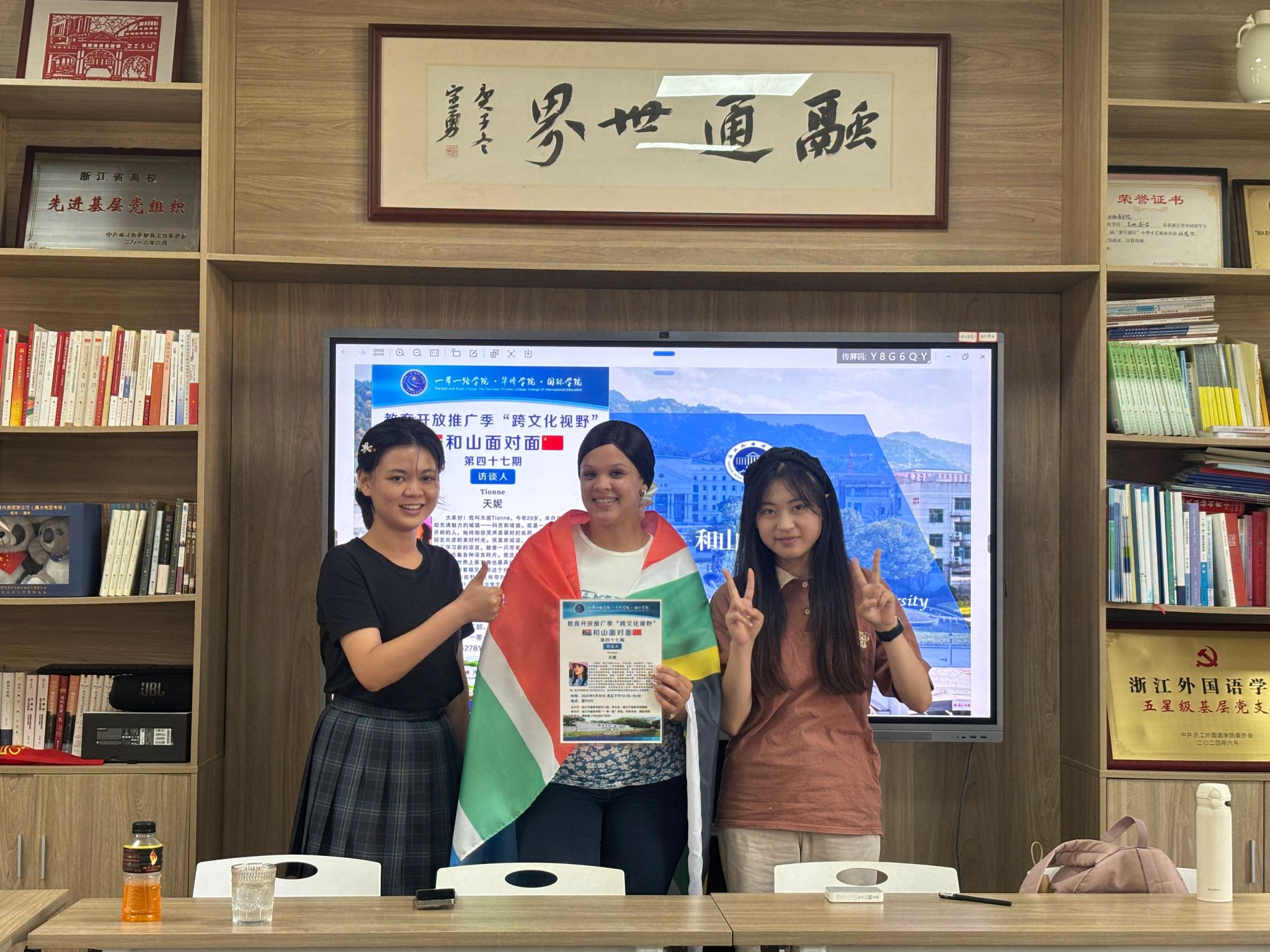为了进一步深入了解并关心国际留学生在校期间的学习与生活状况,同时增进中外学生对不同国家文化的认识和理解,致力于培养学生的国际视野,并促进跨文化的交流与文明间的对话,国际学院特别策划了教育开放推广季活动——“跨文化视野”系列之“和山面对面”访谈节目。
本次活动由旅游管理专业学生暨娅晴主持,特邀来自南非的留学生天妮(Tionne)作为嘉宾。天妮以其热情开朗的性格和独特的文化视角,带领现场师生踏上了一场充满阳光与节奏的非洲文化之旅。在访谈中,天妮不仅分享了南非丰富多彩的民族文化、她对中文学习的热情与坚持,还讲述了自己在南非的成长经历以及来到中国后的文化适应过程。她以亲身经历展现了中非文化之间的差异与共鸣,尤其对中国年轻人的生活方式、语言学习的挑战以及饮食文化的体验进行了生动而真挚的讲述。这场交流不仅拓宽了大家的国际视野,也进一步促进了校园内的多元文化交流与理解。
天妮(Tionne),来自南非科克斯塔德,浙江外国语学院2025级汉语语言文化专业学生。
Tionne, from Kokstad, South Africa, is a student majoring in Chinese Language and Culture at Zhejiang International Studies University, Class of 2025.

1. 暨娅晴:你为什么选择来中国留学?最初吸引你的因素是什么?
天妮:我选择来中国留学是因为中文在全球经济中的重要性越来越大。我一直觉得语言是了解一个国家最好的方式,而中文对我来说就像是一把打开东方世界的钥匙。另外,我也对中国的历史和文化非常感兴趣,尤其是书法、茶艺和传统节日,我想亲身体验这些。
Ji Yaqing: Why did you choose to study in China? What initially attracted you here?
Tionne: I chose to study in China because of the growing importance of Chinese in the global economy. I’ve always believed that language is the best way to understand a country, and for me, Chinese felt like the key to unlocking the East. I’m also deeply fascinated by Chinese history and culture — especially calligraphy, tea ceremonies, and traditional festivals — and I wanted to experience them firsthand.
2. 暨娅晴:你觉得在中国的生活和你在南非的生活最大的不同是什么?
天妮:我觉得最大的不同是节奏感。在南非,我们更喜欢慢下来,享受每一刻;而在中国,尤其是在城市里,大家总是很忙,很有目标感。刚开始我会有点焦虑,但后来我学会了适应,并从中感受到一种积极的能量。
Ji Yaqing: What do you think is the biggest difference between life in China and life in South Africa?
Tionne: The biggest difference is the rhythm of life. In South Africa, we tend to slow down and savor every moment. But in China, especially in cities, people are always busy and goal-oriented. At first it made me anxious, but over time I learned to adapt and even found inspiration in that energy.

3. 暨娅晴:你在学习中文的过程中遇到哪些挑战?你是如何克服的?
天妮:最大的挑战当然是发音和声调了,有时候一句话读错音,意思就完全变了。还有就是汉字书写,刚开始真的很难记住。但我一直保持乐观的心态,多听、多说、多练习,也从日常生活中不断积累,慢慢就有进步了。
Ji Yaqing: What challenges have you faced while learning Chinese, and how have you overcome them?
Tionne: The biggest challenge has definitely been pronunciation and tones. Sometimes just one wrong tone completely changes the meaning of a sentence. And writing Chinese characters was really hard at first. But I’ve kept a positive mindset, practiced listening, speaking, and writing every day, and slowly improved through daily use and exposure.
4. 暨娅晴:你去过哪些国家?这些经历对你理解中国文化有什么帮助?
天妮:我去过泰国、柬埔寨和马来西亚,在那里工作和教学。这些经历让我对亚洲文化有了初步了解,也让我更容易适应中国的生活节奏。每一种文化都有自己独特的魅力,而中国尤其让我感受到历史与现代的结合。
Ji Yaqing: Have you traveled to other countries? How did those experiences help you understand Chinese culture?
Tionne: I’ve been to Thailand, Cambodia, and Malaysia, where I worked and taught. These experiences gave me my first glimpse into Asian cultures and helped me adjust more easily to life in China. Every culture has its own charm, but China especially showed me how history and modernity can beautifully coexist.

5. 暨娅晴:你有没有参与过什么文化活动或者兴趣班?你喜欢中国的哪种文化表现形式?
天妮:我很喜欢中国传统文化,比如书法、茶艺,还参加过学校的朗诵比赛。最近我还迷上了中国说唱音乐,觉得它很有力量,也很能表达年轻人的想法。
Ji Yaqing: Have you participated in any cultural activities or interest groups? Which form of Chinese culture do you enjoy the most?
Tionne: I really enjoy traditional Chinese culture, such as calligraphy and tea ceremonies. I’ve also joined poetry recitation competitions at school. Recently, I got into Chinese rap music — I find it powerful and expressive of young people’s thoughts.

6. 暨娅晴:你对未来有什么计划?希望在中国继续发展吗?
天妮:我希望以后能在翻译领域发展,也可能考虑在中国创业,毕竟这里的经济机会很多。当然,我也不会忘记自己的祖国南非。无论在哪里,我都希望能把两种文化的优点结合起来,创造属于自己的道路。
Ji Yaqing: What are your plans for the future? Do you hope to develop your career in China?
Tionne: I hope to work in translation, or maybe even start a business in China — there are so many opportunities here. Of course, I’ll never forget South Africa either. No matter where I am, I want to combine the strengths of both cultures and create my own unique path.
7. 暨娅晴:你能用一段话或一首诗,表达一下你对祖国的情感吗?
天妮:当然可以。(她背诵了一首关于南非的诗歌,表达了对家乡土地、亲人和文化的热爱,同时也坦然接受并拥抱在中国生活的挑战与机遇。)
Ji Yaqing: Can you share a poem or a few sentences that express your feelings for your home country?
Tionne: Absolutely. (She recites a short poem about South Africa, expressing love for her homeland's land, people, and culture, while also embracing the challenges and opportunities she faces in China.)

8. 暨娅晴:你觉得中国年轻人和南非年轻人在生活方式或价值观上有什么不同?你如何看待这些差异?
天妮:我觉得中国年轻人非常努力、目标明确,很多人从小就对自己的未来有清晰的规划。而在南非,我们更注重人际关系和当下的快乐,生活节奏慢一些,也更随性。但这并不意味着我们不努力,只是表达方式不同。通过交流,我发现很多中国朋友其实也很羡慕我们的开放和热情。我认为这些差异不是障碍,而是互相学习的机会。Ji Yaqing: What differences have you noticed between Chinese and South African youth in terms of lifestyle or values? How do you view these differences?Tionne: I think Chinese young people are very hardworking and goal-oriented — many have clear plans for their future from an early age. In South Africa, we tend to focus more on relationships and enjoying the moment. Our lifestyle is slower and more relaxed, but that doesn’t mean we’re not ambitious — just more expressive in different ways. Through conversations, I’ve found that many Chinese friends actually admire our openness and warmth. I believe these differences aren’t barriers, but opportunities for mutual learning.


